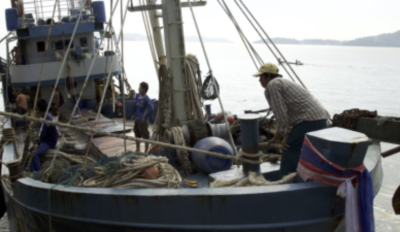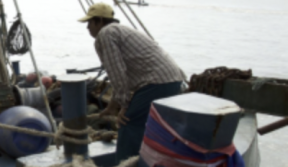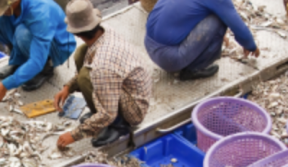
The Groups Say Thailand Should Have Been Downgraded to Tier 2 Watchlist and Taiwan Downgraded to Tier 2
Washington D.C. – Global Labor Justice – International Labor Rights Forum (GLJ-ILRF) and allies in the Seafood Working Group (SWG) today said the U.S. State Department is neglecting labor rights abuses in Taiwan and Thailand’s fishing industry as it maintains their current rankings in the latest Trafficking in Persons (TIP) Report.
For years, the SWG has urged the U.S. State Department to use its diplomatic power to promote respect for labor rights. This year the group issued its own reports on Thailand and Taiwan, detailing its findings of the government’s failure to prevent and address labor rights violations, forced labor, and human trafficking of migrant workers, and calling on the U.S. State Department to downgrade both countries in the TIP Report, which is the U.S. government’s principal diplomatic tool to engage foreign governments on human trafficking.
Instead, the State Department announced its decision to maintain Thailand at Tier 2 and maintain Taiwan at Tier 1, rankings for countries that are either meeting minimum standards to address labor trafficking or taking significant steps to do so.
“This year’s rankings give a pass to Taiwan and Thailand for repression of workers’ rights. The State Department should not consider any country to be taking significant steps to address trafficking while it fails to protect freedom of association for vulnerable workers, including migrant workers and fishers. In particular, labor power, beginning with labor rights for all workers including migrants, must be the focus of any response to forced labor and trafficking,” said GLJ-ILRF Forced Labor Program Director Allison Gill. “The U.S. should only grant Tier 1 or 2 status to a country when the government has developed laws and related practices that ensure migrant workers’ fundamental labor rights, including freedom of association and collective bargaining rights, health and safety protections, and non-discrimination protections. Taiwan and Thailand both fail to meet that standard.”
Fishing workers and their labor organizations in both Taiwan and Thailand and international allies have called for key changes to the industry that will enable fishers in both countries to exercise their fundamental labor rights. In Taiwan, migrant fishers are demanding access to guaranteed, free and encrypted Wi-Fi at sea so they may communicate with each other, their unions and report abuse in real time. In Thailand, migrant fishers and seafood processing workers and their allies are demanding the removal of the discriminatory provision in the Labor Relations Act that reserves the right to form and lead a union to Thai nationals only.
“As GLJ-ILRF’s work has shown, freedom of association and collective bargaining rights are critical for workers fighting back against forced labor, particularly migrant workers, and for creating durable solutions, said GLJ-ILRF Senior Seafood Campaign Coordinator Kimberly Rogovin. “The more the global seafood sector is organized, the less abuse arises. Thailand and Taiwan are both major players in the global fishing industry, sending tuna, shrimp, and other seafood and seafood by-products to the U.S. and around the world. In both countries, workers in the industry face serious abuses and barriers to joining and forming unions.”
In its reports, the SWG called on the State Department to use the TIP Report and the ranking process to support these demands. While the 2023 TIP Report discounts labor rights in its rankings — the U.S. Government can and should support labor rights in the fishing and seafood processing industries in both countries in policymaking.
Taiwan has made insufficient efforts to remain at Tier 1
While the TIP Office has chosen not to advance the interests of labor in its assessment of Taiwan, the U.S. government should be using the U.S.-Taiwan Initiative on 21st Century Trade to protect and enhance rights of workers, including migrant fishers, in Taiwan. As part of any successful trade initiative that addresses forced labor in global supply chains, the Taiwanese government should continue to improve its regulatory practices in advancing the rights of distant-water fishers — in particular, ensuring satellite internet access and fishers’ freedom of association rights on the high seas.
“Both the Taiwan and U.S. governments, who have committed to addressing forced labor as part of the worker-centric trade initiative, should treat access to Wi-Fi as a litmus test for meaningful progress on freedom of association and forced labor prevention for migrant fishers,” said Yi-Hsiang Shih, Secretary General of Taiwan Association for Human Rights (TAHR).
Thailand falls short of minimum standards
The State Department should not have issued the government of Thailand a Tier 2 ranking, as Thai law still prohibits the approximately 4 million Southeast Asian migrant workers from forming or leading labor unions, in violation of fundamental labor standards. As part of its TIP 2022 Action Plan, the Government of Thailand committed in August 2022 to develop laws that would grant migrant workers the legal right to establish labor unions but it has failed to do so. The Labor Relations Act remains unreformed. This explicit discrimination in the law has silenced migrant workers and created huge power imbalances, both of which foster the conditions for forced labor.
“Due to exploitative recruitment practices, a majority of migrant fishers arrive in Thailand in debt bondage, where they do not have the ability to change employers, and have their passports and identity documents retained — clear violations of migrant workers’ rights and red flags for forced labor,” said Johnny Hansen, Chair of the International Transport Workers’ Federation (ITF) Fisheries Section. “Fishers throughout Thailand are organizing to protect themselves after reporting not being paid properly, being forced to work uncompensated overtime, and working in unsafe conditions—but have been denied basic freedom of association and collective bargaining rights that could improve their situation. Thailand is failing to effectively enforce ILO Convention 188 that establishes minimum standards, and is rapidly backsliding into the abhorrent labor conditions in the seafood supply chain that preceded the EU yellow card in 2015,” Hansen said.
The Government of Thailand has also increased migrant workers’ vulnerability to forced labor by permitting SLAPP suits, which aim to silence workers and human rights defenders, to remain ongoing in the Thai judicial system.
The government has also continued to rely on short-term migration management policies that put migrant workers at greater risk of forced labor.
###
Global Labor Justice – International Labor Rights Forum (GLJ – ILRF) is a non-governmental organization that works transnationally to advance policies and laws that protect decent work; to strengthen freedom of association and workers’ ability to advocate for their rights; and to hold corporations accountable for labor rights violations in their supply chains.
The Seafood Working Group (SWG) is a global coalition of human rights, labor and environmental organizations that work together to develop and advocate for effective government policies and industry actions to end the related problems of labor exploitation, illegal fishing and overfishing in the international seafood trade.


